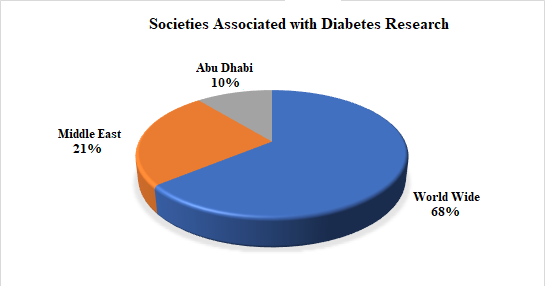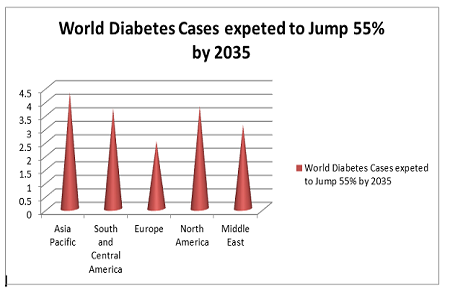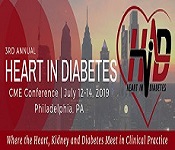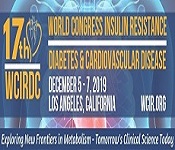Theme: Challenges & Opportunities to bridge the flaws in Diabetic Healthcare
Diabetic 2019
ME Conferences takes the immense pleasure of inviting the scientists, physicians, endocrinologists, physicians and scholars to the ‘’27th International Diabetes and Healthcare conference ‘’on July 18th -19th, 2019, Abu Dhabi,UAE. The Annual conference enlightens the recent advancements related to Diabetes and aims at sharing the knowledge of the expertise in this field where the new generation scholars and researchers can increase their knowledge related to diabetes. The scientific sessions include the various sessions which emphasize on Consequences of Diabetes in Human, Cellular and Molecular Endocrinology, Hypertension and Diabetes, Neurologic problems and Diabetes, Stem Cell Therapy for Diabetes, Endocrine Complications of Diabetes, Treatment of Diabetes and Diabetes in Healthcare.
ME Conferences welcome the delegates across the country to enlighten the young and fresh minds of the scholars, researchers, student communities and industrial delegates to attend the ‘’27th International Diabetes and Healthcare Conference’’ as it is open to research methodologies which explores the new dimensions regarding this field.
Why to attend?
This conference will provide the focused learning on the distribution of knowledge, opportunities to network and discuss science and medicine on diabetes and healthcare and the recent advances and technologies related Diabetes for the making of better health. Fresh minds will have the opportunity to explore more areas of expertise on Healthcare in Diabetes. With members from all around the world increasing the knowledge about Diabetes and Healthcare and the increase in the new advance related to Diabetes, this is your best chance to reach the largest gathering of participants from Diabetes Community
Target Audiences:
- Diabetologists
- Researchers
- Endocrinologists
- Doctors
- Physicians
- Nutritionists
- Scientists
- Academic Professionals
- Medical Colleges and Pharma Companies
- Medical Hospitals
- Students
- Business Entrepreneurs
- Manufacture Medical Devices & Companies
- Healthcare Training Institute
- Oncologists
- Neurologists
- Pediatric doctors
- Fitness Professionals
- Public Health Professionals
Track: Diabetic Retinopathy
Diabetic retinopathy is a condition that happens in individuals who have diabetes. It causes dynamic harm to the retina, which acts as a light sensitive covering at the back of the eye. Diabetic retinopathy is a serious condition which causes threatening eye sight complications.Diabetes meddles with the body's capacity to utilize and store sugar (glucose). The disease is characterized by an excess of sugar in the blood, which causes damage to all the parts of the body, including the eyes.
Diabetes damages the blood vessels in the retina. Diabetic retinopathy happens when these small blood vessels spill blood and other liquids. This causes swelling of retinal tissue which results in cloudy or obscured vision. The condition usually affects both the eyes. The longer the person with diabetes the more likely he will develop diabetic retinopathy. When left untreated, diabetic retinopathy can cause blindness.Diabetic retinopathy is perceived in the midst of an eye examination that consolidates visual keenness test, Fundus Fluorescence angiography (FFA), and Optical soundness tomography (OCT). The NEI is coordinating and supporting the investigations on the new approaches to identify, treat, and deflect vision incident in people with diabetes.
Track: Stem Cell Therapy for Diabetes
Undeveloped or undifferentiated cells holds immense promise for the treatment of patients with diabetes mellitus. Research on the capacity of human embryonic undifferentiated cells to separate into islet cells has characterized the developmental stages and transcription factors engaged with this process. In any case, the clinical uses of human embryonic stem cells are constrained by ethical concerns, and in addition the potential for teratoma formation. Alternative types of undeveloped cell treatments includes -induced pluripotent stem cells, umbilical cord stem cells and bone marrow-derived mesenchymal undifferentiated cells, have turned into a area of immense investigation. Late advances in stem cell treatment may transform this into a practical treatment for diabetes. Undifferentiated cells treatment for Diabetes type 2 enables the body's normal mending procedure to work quicker and all the more adequately.
Track: Diabetes in Healthcare
Ethnic, social, religious, sex, and financial contrasts influence medicinal services access and intricacy chance in individuals with diabetes. Ongoing investigations have prescribed bringing down the BMI cut point for testing for Asian Americans to ≥23 kg/m2. Ladies with diabetes, contrasted and men with diabetes, have a 40% more serious danger of occurrence coronary illness. Financial and ethnic imbalances exist in the arrangement of human services to people with diabetes. Accordingly, kids with type-1 diabetes from racial/ethnic populaces with lower financial status are in danger for poor metabolic control and poor enthusiastic working. Critical racial contrasts and hindrances exist in self-checking and results.
Track: Endocrine Complications of Diabetes
The endocrine complications are routinely unusual, which includes mixed picture of hypo outflow and hyper release because of the analysis instruments connected with the endocrine structure. Endocrinology centers by and large around the endocrine organs or those organs that may understand hormone clumsiness. These organs meld the pituitary, thyroid, adrenals, ovaries, gonads, and pancreas. This can be a tangled strength. There are different organs and hormones in the body, each with their own particular occupations to do. It is a fragile compound change that keeps our bodies running viably with close by no exertion on our part. Patients with diabetes mellitus have an extended risk of working up some rheumatologic infirmities, including muscle limited corruption, carpal entry disorder, and so forth.
Track: Diabetes and Cardiovascular Diseases
Diabetes is a prime hazard factor for cardiovascular disease(CVD). Vascular disorders incorporate retinopathy and nephropathy, peripheral vascular infection (PVD), stroke, and coronary artery disease(CAD). Diabetes additionally influences the heart muscle, causing both systolic and diastolic heart failures. The etiology of this excess cardiovascular morbidity and mortality is not completely known. Evidences shows that hyperglycemia, the sign of diabetes, adds to myocardial damage after ischemic events. it is clearly not the only cause, because both pre-diabetes and the presence of the metabolic syndrome, even in normoglycemic patients, increase the risk of most types of cardio vascular diseases.
Diabetic cardiomyopathy can be characterized as myocardial infection in patients with diabetes that can't be credited to some other referred to CVD, Because of the structural and functional changes that happen in diabetic cardiomyopathy, patients with diabetes are vulnerable to heart failures. At least two diverse epidemiological studies using diagnostic methods found the prevalence of asymptomatic diastolic dysfunction in patients with type 2 diabetes to be somewhere in the range of 52 and 60%.Left ventricular diastolic dysfunction, characterised by impaired early diastolic filling, delayed isovolumetric relaxation, and increased atrial filling has even been found in young patients with Type 1 Diabetes.
Track: Pediatric Diabetes
Accomplishing ideal glycemic control in children and adolescents with diabetes remains a major challenge. The Management of diabetes requires an age-explicit methodology, considering the necessities and characteristics related to specific developmental stages. Variable eating patterns and physical activity, along with limited ability impart symptoms of hypoglycemia/hyperglycemia are the principle challenges in youngsters.In adolescents, changes in insulin sensitivity identified with physical development and pubertal hormonal changes, mental and behavioural issues and poor compliance can entangle diabetes management. Additional factors in youngsters with diabetes include family dynamics, wellbeing status and care outside home.
Pediatric diabetes is a condition over know youngsters which deals with endocrine organs disorder, like assortments about physical development and sexual enhancement for adolescence, diabetes also one among them. Pediatric type 1 diabetes is a ceaseless illness depicted toward those bodies having inability to process insulin response due to immune decimation of beta cells in the pancreas. The larger part pediatric patients with diabetes have type 1 than exogenous insulin response. Adolescents with type 2 diabetes are more prone to cardiovascular disease and vascular difficulties. Every year,about 13,000 adolescents are determined to have diabetes. In youngsters Type 1 diabetes is most frequent type. There is a strong need for future studies assessing each of the drugs used in pediatric type 2 diabetes, due to potential differences in safety and efficacy profiles between different age groups.
Track: Recent Advances in Nanotechnology for Diabetes
Nanotechnology offers detecting technologies that provide progressively accurate and timely medical information for diagnosing a disease.Tests like diabetes blood glucose levels expect patients to control the test themselves to avoid the danger of their blood glucose falling to dangerous levels. Children the elderly will most likely be unable to perform the test properly, timely or without impressive pain. Nanotechnology can now offers new implantable or potentially wearable detecting advances that give accurate medical information to a great extent.
Nanotechnology in diabetes has empowered the advancement of novel glucose estimation and insulin transport modalities which drastically enhances the personal satisfaction for diabetics. The difficulties in diabetes is the advancement usage of glucose sensors which gives glucose estimations effortlessly and as often as possible, with the objective of nonstop glucose estimation. Glucose sensors and self-managed insulin transport frameworks have been developed by nanotechnology.
Track: Clinical Informatics
Clinical Informatics is the use of informatics and data innovation to convey human services administrations. It also alluded as applied clinical informatics and operational informatics.
Clinical informatics incorporates a wide range of subjects running from clinical decision support to visual pictures (e.g. radiological, pathological, dermatological, ophthalmological, and so forth)from clinical documentation to provide order entry frameworks; and from system structural design to system usage and adoption issues.
Track: Recent advancement in Diabetes
Despite the fact that Diabetes has been known since vestige, medications have been known altogether since the 21st century. The choice and use of a glucose-lowering therapy are subjected to numerous contemplations like body mass index, capacity to self-monitor the glucose level are the ongoing advances in Diabetes.
The medications utilized for the treatment of type 2 diabetes presents limitations, they have symptoms. Alternate meds systems establish a combination of treatment of insulin with sulfonylureas which decreases the day by day requirement of insulin and insulin-metformin combination treatment. Drug induced diabetes insipidus is unresponsiveness of the kidneys to the action of antidiuretic hormone. Drugs which are used to treat obesity are demonstrating to have significant health benefits for patients with type 2 diabetes. Pancreas and islet cell transplantation is the main subject for recent research. Nano-medication has a great deal for the world of medicines in diabetes.
Track: Diabetes and Nutrition
Medicinal nutrition therapy is a vital segment of diabetes the management and of diabetes self-management training. However numerous misguided judgments exist concerning nutrition and diabetes. Besides, in clinical practice, nourishment suggestions that have practically no supporting proof have been are as yet being given to people with diabetes. In like manner, this position statement proclamation gives evidences based standards and suggestions for diabetes medicinal nourishment treatment.
Nutrition plays a key role in treating the patients with Diabetes. Eating well in a balanced manner can control the blood glucose levels of the patient.The key diet of nutrition for the patients with diabetes are Macronutrients. Patients suffering from type-1 and type -2 diabetes have to intake different nutritional diets to maintain their health. Low carbohydrate diets are generally preferred for the type-1 diabetic patients.
Track: Diabetes and Cancer
Individuals with diabetes are at higher hazard for a few, yet not all, types of malignant growth. The connection between the two infections is intricate and encompassed with unanswered inquiries.
The connection between the two diseases might be somewhat because of shared risk factors, including aging, overweight and obesity, diet, physical activity, alcohol and smoking. But at the same time it's conceivable that diabetes could straightforwardly influence malignancy chance through metabolic variations from the norm. These incorporate overabundance glucose, insulin resistance, and abnormal amounts of insulin and related factors, for example, insulin-like development factor-1 (IGF-1), which has been involved in malignant growth. Chronic inflammation in people with diabetes, may also contribute to elevated cancer risks.
Track: Genetic Diabetes
Diabetes is an complex set of diseases with no single reason. Hereditary components make a few people increasingly defenseless against diabetes, especially with the right environment.
Diabetes, frequently implied as diabetes mellitus, portrays a social affair of metabolic diseases is either in light of the fact that insulin creation is inadequate, or in light of the way that the body don't respond suitably to insulin, or both the sorts. In type 1 diabetic patients, they acquire hazard factors from the both parents. Ongoing exploration has demonstrated that offspring create 3%of the time if the mother has the condition and 5% if the father has the condition. Ecological changes also trigger type 1 diabetes. A few infections likewise trigger type-1 diabetes like measles infection, rotavirus.Type-2 is the more generic type of disorder which incorporates 90% of the world cases. 70% patients with type-2 diabetes are acquired from the parents while the rest of the patients were obese.
Track: Diabetes and Immunology
Type-1 (insulin-subordinate) diabetes mellitus is unequivocally connected with immune system associated with the loss of beta-cells in the pancreatic islets. In spite of significant advancement in our comprehension of genetic susceptibility factors and islet autoimmunity going before the clinical beginning of Type-1 diabetes there are extensive holes in our insight. In the first place, the etiology is indistinct. It is theorized that different etiological variables may start a typical pathogenic pathway which results in invulnerable intervened beta-cell destruction. We should take in more about the conceivable significance of gestational contaminations, and in addition segregation of viral DNA or RNA from the blood of new-beginning patients or marker-positive individuals.
Diabetes(Type-2)portrayed by impaired insulin secretion, glucose intolerance, and hyperglycemia.Inflammation is considered as a main driving force in Type- 2 diabetes and related complications also arise along with it.Immune system is altered in obesity and type-2 diabetes with changes in adipose tissue,liver, pancreatic islets and the vasculature and circulating leukocytes.
Track: Biomarkers for Diabetes
"Biomarker", are designated "molecular marker" or a "signature particle". These markers gives the degree of illness as they lay outside calmly. HbA1c is considered a biomarker for a risk factor that is for retinopathy, nephropathy and other vascular sicknesses. Biomarkers empower preventive measures to be connected at the subclinical stage and the reactions to preventive or helpful measures to be observed. Cases in the course of recent decades have yielded test sets, for the most part blood products and urine from an expansive classification of patients with both type 1 and type 2 diabetes.
Track: Cellular and Molecular Endocrinology
The Molecular and cell biology of endocrine organs and their products is addressed by Molecular and Cellular Endocrinology. Useful investigation of genomic, epigenomic and proteomic examples of hormone activity assumes a critical role in the molecular endocrinology. Subjects identified with biochemical and molecular parts of endocrine research and cell regulation incorporate hormone-regulated gene expression, structure and physicochemical properties of hormones, hormone receptors and other hormone-binding components, synthesis, secretion, metabolism and inactivation of hormones, synapses, hormonal control of differentiation, related control components in non-mammalian systems.
Track: Case Studies and New Research Advances in Diabetes
The primary point of the diabetes is to distinguish the general state of the disorder, there are various case and research studies including animal models and human models. Type 2 diabetes is a cutting edge pandemic. Two particular kinds of prediabetes, contingent upon when the body fails to produce insulin, the hormone that signals body tissues to utilize glucose: impaired glucose tolerance and impaired fasting glucose. Researchers are breaking down the information to comprehend the impacts of various medications on the two particular types of prediabetes.
Track: Consequences of Diabetes in Human
Diabetes influences long term damage to our body. Diabetic complexities take a couple of long periods of ineffectively controlled diabetes to develop and these can be anticipated by keeping up a strong dimension of control on diabetes, heart rate, glucose level and cholesterol. Diabetes and coronary illness are firmly related. Diabetes adds to hypertension and identifies with elevated cholesterol.Neuropathy is usually seen by tingling sensation in the hands or feet, absence of excitement in the penis or clitoris, unreasonable sweating. Unmanaged diabetes can also prompt skin conditions like the eruption of xanthomatotic, which causes hard yellow knocks with a red ring, advanced sclerosis, which results in tough skin frequently on the hands or feet, diabetic dermopathy, which causes dark colored patches on the skin.
Track: Hypertension and Diabetes
Hypertension is a significantly normal condition in diabetes, affecting close around 20– 60% of patients with diabetes. In type 1 diabetes, hypertension reflects the start of diabetic nephropathy which constructs the threat of both full scale vascular and small scale vasculars disorder. Uncontrolled diabetes extends the danger for hypertension. Insulin protection type 2 diabetes, hyperlipidemia and central strength have been filed in a couple of masses. Other possible purposes behind hypertension with diabetes and insulin protection/ hyperinsulinemia incorporate actuation of the thoughtful sensory system, extended renal tubular sodium maintenance, raised intracellular calcium center and atherosclerosis and vascular smooth muscle cell multiplication.
Track: Neurologic Problems and Diabetes
A group of nerve issue caused by diabetes is called Diabetic neuropathy. The periphery nerves, autonomic nerves, cranial nerves, spinal string, and brain are generally connected with diabetes.Some genetic issue identified with diabetes joins mitochondrial disorder, wolfram disorder etc.Diabetic neuropathies moreover emit an impression of being especially ordinary in people who have issues controlling their blood glucose, in like manner called glucose, and furthermore those with raised measures of blood fat and circulatory strain and the people who are expansive. Reactions of nerve damage, generally, consolidate deadness, shivering, or distress in the toes, feet, legs, hands, arms, and fingers, indigestion, disorder, or heaving, detachment of the insides or blockage. Some genetic issue identified with diabetes joins mitochondrial disorder, wolfram disorder etc.
Track: Diabetes and Treatment
Diabetes is a regular affliction, yet every individual needs interesting thought. A fasting glucose test, an oral glucose opposition test (OGTT), The A1C test are three of the most generally perceived tests for the preliminary of Diabetes. Research on Insulin is broadly inspected in National Diabetes Conference and Diabetes affiliations. Present day revelations can help people living with type 1 or type 2 diabetes and treated with insulin to accomplish the dream of ideal control of glucose. Eating a balanced eating routine is major for people who have diabetes, so working up with the authority; dietician or nutritionist in like manner expect a vital part in the control of diabetes.
With the quick difference in way of life and atmosphere, step by step diabetes is getting expanded among the people groups. The pervasiveness of diabetes for all age-bunches worldwide was assessed to be 3% out of 3000 and 5.2% of every 2080. A malady is a specific anomalous condition or a turmoil of that influences part or the majority of life forms. In a previous couple of years, Diabetes is rising quickly among the vast measure of a populace. Diabetes in any event pairs a man's danger of death. In the United States, diabetes cost $300 billion out of 2012. In this manner, the reason for sorting out the Diabetic 2018 meeting in Helsinki is to re-join the general population on a worldwide stage and influence them to raise hands against Diabetes.
Importance & Scope:
Diabetes reduce the burden of diabetes mellitus (DM) and improve the quality of life for all persons who have or are at risk for diabetes mellitus. As the number of patients grows across the globe, there has never been a stronger and more urgent need for therapeutic measures that arrest the growth of the disease and alleviate its secondary manifestations.
DM affects an estimated 30 million people in the United States and is the 7th leading cause of death. It increases the all-cause mortality rate 2 times compared to persons without diagnosed diabetes. It Increases the risk of heart attack by 2 times, in addition to these human costs, the estimated total financial cost of DM in the United States in 2014 was $250 billion, which includes the costs of medical care, disability, and premature death.
The importance of both diabetes and their comorbidities will continue to increase as the population ages. Therapies that have proven to reduce microvascular and macrovascular complications will need to be assessed considering the newly identified comorbidities.
Why Abu Dubai:
Abu Dhabi is the capital and the second most populous city of the United Arab Emirates (the most populous being Dubai), and also the capital of the emirate of Abu Dhabi, the largest of the UAE’s seven emirates. Abu Dhabi lies on a T-shaped island jutting into the Persian Gulf from the central western coast. It is on the southern eastern side of Arabian Peninsula adjoining the Persian Gulf.
Abu Dhabi is the wealthiest emirate of the UAE in terms of Gross Domestic Product (GDP) and per capita income. More than $1 trillion is invested worldwide in this city alone. In 2014, the GDP per capita also reached $69,900, which ranks ninth in the world after Qatar, Liechtenstein and Luxembourg and many others.
Societies Associated with Diabetes Research:
- SBDR - Society for Biomedical Diabetes Research
- Austrian Diabetes Association
- Flemish Diabetes Association
- Association of Juvenile Diabetes
- Canadian Diabetes Association
- Juvenile Diabetes Foundation of Chile
- German Diabetes Union
- Diabetic Society of Singapore
- Japan Diabetes Society
- Hong Kong Diabetes Federation
- The International Society of Gynecological Endocrinology
- Royal Society of Medicine Endocrinology and Diabetes Section
- International Society of Psych neuroendocrinology
- International Neuroendocrine Federation
- European Society of Endocrinology
- Clinical Endocrinology Trust
- Swiss Diabetes Society
- Spanish Diabetes Society
- Korean Diabetes Association.
Diabetic Research Centers World wide:
- University of Michigan Albert Einstein-Mount Sinai Diabetes Center
- Boston Area
- Columbia University
- Indiana University
- Johns Hopkins University/University of Maryland
- Joslin Diabetes Center - Harvard Medical School
- Stanford University
- University of Alabama at Birmingham
- UCSD-UCLA
- UCSF
- University of Chicago
- University of Michigan
- University of Pennsylvania
- University of Washington
- Washington University
- Vanderbilt University
- Yale University
- Albert Einstein College of Medicine
- Emory University
- Kaiser Foundation Research Institute
- University of Chicago
- University of Colorado
- International Diabetes Federation, UAE
- Public Health Research Center, Abu Dhabi, UAE
- Imperial College London Diabetes Centre, UAE
- Global Diabetes Research Centre, India.
- Diabetes Research Center, PUMCH, China
- Center for Diabetes & Endocrinology, Japan
- Leicester Diabetes Centre, United Kingdom
- Garvan Institute of Medical Research, Australia
- Persatuan Diabetes Indonesia Research Centre
Diabetic Hospitals Across the world:
- Mayo Clinic – Rochester, MN
- Cleveland Clinic – Cleveland, OH
- Massachusetts General Hospital – Boston, MA
- Johns Hopkins Hospital – Baltimore, MD
- UCSF Medical Center – San Francisco, CA
- New York-Presbyterian University Hospital of Columbia and Cornell – New York, NY
- Yale-New Haven Hospital – New Haven, CT
- Northwestern Memorial Hospital – Chicago, IL
- UCLA Medical Center – Los Angeles, CA
- University of Washington Medical Center – Seattle, WA
- Hospitals of the University of Pennsylvania-Penn Presbyterian – Philadelphia, PA
- Brigham and Women’s Hospital – Boston, MA
- Florida Hospital Orlando – Orlando, FL
- Cedars-Sinai Medical Center – Los Angeles, CA
- Barnes-Jewish Hospital/Washington University – St. Louis, MO
- Beaumont Hospital – Grosse Pointe, MI
- Mount Sinai Hospital – New York, NY
- Froedtert Hospital and the Medical College of Wisconsin – Milwaukee, WI
- Lancaster General Hospital – Lancaster, PA
- University of Kansas Hospital – Kansas City, KS
- KEM Hospital, Pune
- Lakeshore Hospital & Research Center, Kochi
- All India Institute of Medical Sciences (AIIMS), Delhi
- M.V. Hospital for Diabetes, Chennai
- St Vincent's Hospital Sydney
- The Australian Centre for Behavioral Research in Diabetes.
- Mahkota Diabetes Centre, Indonesia
- Newcastle Hospitals, UK
- Parkmore Medical Centre, South Africa
- Degla Diabetic Center, Egypt
- Diabetes & Metabolism Centre, Singapore
Diabetic Hospitals in UAE:
- Canadian Specialist Hospital, Dubai
- Zulekha Hospitals
- Mediclinic City Hospital
- Imperial College London Diabetes Center, Abu Dhabi,
- University Hospital Of sharjha
- Uptodate Medical centre, Al Diyafah
- Marfaq Hospitals, Abu Dhabi
- Dr. Joseph Polyclinics, Karama
- Imperial College London Diabetes Center, Abu Dhabi
- HealthPlus Diabetes & Endocrinology Center, Abu Dhabi
- SKMC Center for Diabetes & Endocrinology, Abu Dhabi
- HealthPlus Family Clinic - Al Bandar
- Cleveland Clinic, Abu Dhabi
Figure 1: Rise in diabetes global market from the year 2016-2020 with an increase in 4.4% compound annual growth rate (CAGR).

Figure 2: World Diabetes Analysis
Figure 3: Societies Associated with Diabetes Research

Related Societies:
Middle East Countries: Emirates Diabetes Society | Global Health Partner Diabetes Centre | Joslin Diabetes Centre | Al Jalila Foundation Research Centre | Diabetes Research Institute | Diabetes Education in Tribal Schools (DETS) | Syria Diabetes Association | Israel Diabetes Association | Turkish Diabetes Association | Saudi Diabetes & Endocrine Association | The Egyptian Union of Diabetes Association | Lebanese Diabetes Association | Bahrain Diabetic Association | Cyprus Diabetes Association
USA: American Association of Diabetes Educators | American Diabetes Association | Canadian Diabetes Association | American Association for Clinical Endocrinology | Diabetes Canada
Asia-Pacific: Australian Diabetes Society | Asian Association for the Study of Diabetes | Diabetes Association of Nigeria |Diabetes Association of the Republic of China | Asian Diabetic Association | Diabetes Society of the Chinese Medical Association | Diabetic Association of India | Japan Diabetes Society | Korean Diabetes Association | Indonesian Diabetes Association | Diabetes Association of Thailand | Malaysia Diabetes Association | Diabetic Society of Singapore | Philippine Diabetes Association | Diabetic Association of Bangladesh | Diabetes New Zealand | Diabetes Association of Sri Lanka
Europe: European Society of Endocrinology | Central European Diabetes Association | FAND - Italian Association of Diabetics | Italian Association for the Defense of the Interests of Diabetics | International Diabetes Federation- Italy | German Diabetes Union | Franquise Association of Diabetics | British Diabetes Association | Spanish Diabetic Society |Hellenic Diabetology Association| Swiss Diabetes Association | Dutch Diabetes Association |Polish Diabetes Association | Austrian Diabetics Association | Swedish Diabetic Association | Norwegian Diabetes Association | Maltese Diabetes Association | Czech Diabetes Society | Society of Diabetes, Nutrition & Metabolic Diseases | Hungarian Diabetes Association | Bulgarian Diabetes Association | Cyprus Diabetes Association | Finnish Diabetes Association | Albania Diabetes Association | Lithuania Diabetes Association | Estonia Diabetes Association
Related Conferences :
- International Conference on Diabetes and Cholesterol Metabolism, March 14-15, 2019 Bali, Indonesia
- 25th International Conference on Human Metabolic Health- Diabetes, Obesity & Metabolism, March 21-22, 2019 Dubai, UAE
- 2nd Global Meeting on Diabetes and Endocrinology, May 30-31, 2019 Istanbul, Turkey
- 15th World Congress on Endocrinology & Diabetes, September 19-20, 2019 | Prague, Czech Republic
- World Congress on Insulin Resistance Diabetes, Endocrinology Metabolism and Nursing, July 05-06-2019 Columbus, USA
- 30th International Congress on Prevention of Diabetes and Complications, October 21-22, 2019 | Zurich, Switzerland
- 2nd Annual Congress on Diabetes and its Complications, March 25-26, 2019 Hong Kong
- Asia Pacific Diabetes and Endocrinology Congress, February 27-28, 2019 Tokyo, Japan
- 31st International Conference on Pediatric and Adolescent Diabetes, February 27-28, 2019 | Tokyo, Japan.
- 12th World Congress on Endocrinology and Metabolic Disorders, May 13-14th, 2019 Osaka, Japan
Diabetic 2018
We would like to thank all of our wonderful keynotes, speakers, conference attendees, students, associations, media partners, and guests for making Diabetic 2018 a successful event.
With the overwhelming success of the previous conferences, Conference series hosted the “27th International Diabetes and Healthcare Conference” during November 26-27, 2018, at Radisson Blu Royal Hotel, Helsinki, Finland with the theme “Acquainting New Insights of Diabetes and Healthcare” was a great success, where eminent keynote speakers from various reputed institutions and organizations with their resplendent presence addressed the gathering.
Benevolent response and active participation was received from the renowned experts and Editorial Board Members of Conference series Journals as well as from the Dieticians, Nutritionists, researchers, students and leaders in Diabetes, who made this event successful.
The Conference was carried out through various informative and cutting edge sessions, in which the discussions were held on the following thought provoking and cerebrating scientific tracks:
· Recent Advancement in Diabetes
· Diabetes and Nutrition
· Diabetes and Cancer
· Genetic Diabetes
· Diabetes and Immunology
· Biomarkers for Diabetes
· Clinical Informatics
· Cellular and Molecular Endocrinology
· Case Studies and New Research Advances in Diabetes
· Consequences of Diabetes in Human
· Hypertension and Diabetes
· Neurologic problems and Diabetes
· Diabetes and Treatment
· Diabetic Retinopathy
· Stem Cell Therapy for Diabetes
· Diabetes in Healthcare
· Endocrine Complications of Diabetes
· Diabetes and Cardiovascular Diseases
· Pediatric diabetes
· Recent advances in nanotechnology for diabetes
The conference was moderated by Rajesh Jain from Jain Hospital, India
The conference was embarked with an opening ceremony followed by lectures delivered by members of the Keynote forum. The adepts who promulgated the theme with their exquisite talk were:
- Marcello Ciaccio, from University of Palermo, Italy
- Jaakko Tuomilehto, from University of Helsinki and National Institute for Health and Welfare, Finland
- Huang Wei Ling, from Medical Acupuncture and Pain Management Clinic, Brazil
All the above mentioned Keynote speakers gave their energetic and fruitful contributions and special thanks to our Honourable Moderator Rajesh Jain from Jain Hospital, India for their remarkable contribution towards smooth functioning at Diabetic 2018
Conference Sessions Chair:
- Huang Wei Ling, from Medical Acupuncture and Pain Management Clinic, Brazil
ME Conferences offers its heartfelt appreciation to Societies and Organizations and is also obliged to the Organizing Committee Members, adepts of field, various outside experts, company representatives and other eminent personalities who interlaced with Conference series in supporting and making the conference never before one.
Your rejoinder is our inspiration; keeping this motto in mind and being witnessed the triumph of Diabetic 2018, ME Conferences is delighted to announce the next event. Mark your calendars for the upcoming extravaganza, “27th International Diabetes and Healthcare Conference” to be held during July 18-19, 2019 at Abu Dhabi, UAE.
For details Visit: https://diabetic.healthconferences.org/
Conference Highlights
- Recent Advancement in Diabetes
- Diabetes and Nutrition
- Diabetes and Cancer
- Genetic Diabetes
- Diabetes and Immunology
- Biomarkers for Diabetes
- Cellular and Molecular Endocrinology
- Case Studies and New Research Advances in Diabetes
- Consequences of Diabetes in Human
- Hypertension and Diabetes
- Neurologic Problems and Diabetes
- Diabetes and Treatment
- Diabetic Retinopathy
- Stem Cell Therapy for Diabetes
- Diabetes in Healthcare
- Endocrine Complications of Diabetes
- Diabetes and Cardiovascular Diseases
- Pediatric Diabetes
- Recent Advances in Nanotechnology for Diabetes
- Clinical Informatics
To share your views and research, please click here to register for the Conference.
To Collaborate Scientific Professionals around the World
| Conference Date | July 18-19, 2019 | ||
| Sponsors & Exhibitors |
|
||
| Speaker Opportunity Closed | Day 1 | Day 2 | |
| Poster Opportunity Closed | Click Here to View | ||
Useful Links
Special Issues
All accepted abstracts will be published in respective Our International Journals.
- Journal of Diabetes & Metabolism
- Endocrinology & Metabolic Syndrome
- Journal of Diabetic Complications & Medicine
Abstracts will be provided with Digital Object Identifier by























